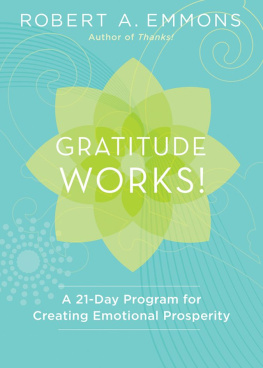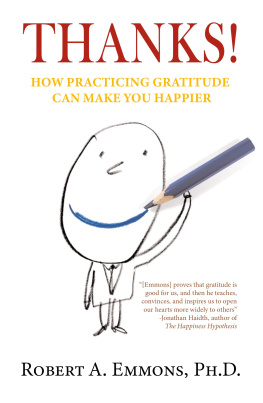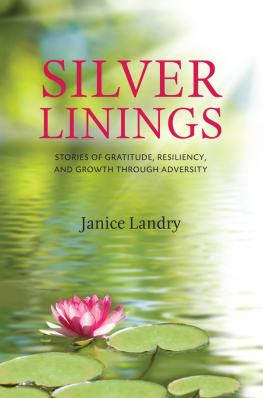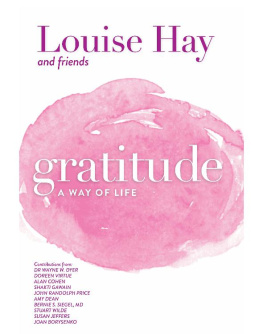Contents

Cover image: aleksandarvelasevic/istock
Cover design: JPuda
Copyright 2013 by Robert A. Emmons. All rights reserved.
Published by Jossey-Bass
A Wiley Imprint
One Montgomery Street, Suite 1200, San Francisco, CA 941044594 www.josseybass.com
No part of this publication may be reproduced, stored in a retrieval system, or transmitted in any form or by any means, electronic, mechanical, photocopying, recording, scanning, or otherwise, except as permitted under Section 107 or 108 of the 1976 United States Copyright Act, without either the prior written permission of the publisher, or authorization through payment of the appropriate per-copy fee to the Copyright Clearance Center, Inc., 222 Rosewood Drive, Danvers, MA 01923, 978-750-8400, fax 978-646-8600, or on the Web at www.copyright.com . Requests to the publisher for permission should be addressed to the Permissions Department, John Wiley & Sons, Inc., 111 River Street, Hoboken, NJ 07030, 201-748-6011, fax 201-748-6008, or online at www.wiley.com/go/permissions .
Limit of Liability/Disclaimer of Warranty: While the publisher and author have used their best efforts in preparing this book, they make no representations or warranties with respect to the accuracy or completeness of the contents of this book and specifically disclaim any implied warranties of merchantability or fitness for a particular purpose. No warranty may be created or extended by sales representatives or written sales materials. The advice and strategies contained herein may not be suitable for your situation. You should consult with a professional where appropriate. Neither the publisher nor author shall be liable for any loss of profit or any other commercial damages, including but not limited to special, incidental, consequential, or other damages. Readers should be aware that Internet Web sites offered as citations and/or sources for further information may have changed or disappeared between the time this was written and when it is read.
Jossey-Bass books and products are available through most bookstores. To contact Jossey-Bass directly call our Customer Care Department within the U.S. at 800-956-7739, outside the U.S. at 317-572-3986, or fax 317-572-4002.
Wiley also publishes its books in a variety of electronic formats and by print-on-demand. Some material included with standard print versions of this book may not be included in e-books or in print-on-demand. If the version of this book that you purchased references media such as CD or DVD that was not included in your purchase, you may download this material at http://booksupport.wiley.com . For more information about Wiley products, visit www.wiley.com .
All scripture quotations, unless otherwise indicated, are taken from the Holy Bible, New International Version, NIV. Copyright 1973, 1978, 1984, 2011 by Biblica, Inc. Used by permission of Zondervan. All rights reserved worldwide. www.zondervan.com The NIV and New International Version are trademarks registered in the United States Patent and Trademark Office by Biblica, Inc.
Library of Congress Cataloging-in-Publication Data
Emmons, Robert A.
Gratitude works! : a twenty-one-day program for creating emotional prosperity / Robert A. Emmons. First edition.
pages cm
Includes bibliographical references and index.
ISBN 978-1-118-13129-9 (cloth); ISBN 978-1-118-41905-2 (ebk); ISBN 978-1-118-42085-0 (ebk); ISBN 978-1-118-43372-0 (ebk)
1. Gratitude 2. GratitudeReligious aspectsChristianity. 3. Happiness. I. Title.
BF575.G68E458 2013
179.9dc23
2012048780
FIRST EDITION
Preface
Consider these recent headlines: Want to Be Happier? Be More Grateful, The Formula for Happiness: Gratitude Plays a Part, Teaching Gratitude, Bringing Happiness to Children, and my personal favorite, Key to Happiness Is Gratitude, and Men May be Locked Out.
Buoyed by research findings from the field of positive psychology, the happiness industry is alive and flourishing in the United States. Each of these headlines includes the explicit assumption that gratitude should be part of any twelve-step, thirty-day, or ten-key program to develop happiness. In modern times gratitude has become untethered from its moral moorings, and collectively we are worse off because of this. When the ancient Roman philosopher Cicero stated that gratitude was the queen of the virtues, he most assuredly did not mean that gratitude was merely a stepping stone toward personal happiness. Gratitude is a morally complex disposition, and reducing this virtue to a technique or strategy to improve ones mood is to do it an injustice.
Even restricting gratitude to an inner feeling is insufficient. In the history of ideas, gratitude is considered an action (returning a favor) that is not only virtuous in and of itself but also valuable to society. To reciprocate is the right thing to do. In a book whose title translates On Duties, Cicero wrote, There is no duty more indispensable that that of returning a kindness.
Dont get me wrong. Gratitude does matter for happiness. As someone who for the past decade has contributed to the scientific literature on gratitude and well-being, I would certainly grant that. The tools and techniques of modern science have been used to increase understanding of the nature of gratitude and why it is important for human flourishing more generally. From childhood to old age, accumulating evidence documents the wide array of psychological, physical, and relational benefits associated with gratitude. Yet I have come to the realization that by taking a gratitude lite approach we have cheapened gratitude. Gratitude lite does not do justice to its complexities. Gratitude is important not only because it helps us feel good but also because it inspires us to do good. Gratitude heals, energizes, and transforms lives in myriad ways consistent with the notion that virtue is its own reward and produces other rewards.
To give a flavor of these research findings, dispositional gratitude has been found to be positively associated with qualities such as empathy, forgiveness, and the willingness to help others. For example, people who rate themselves as having a grateful disposition perceive themselves as having more socially helpful characteristics, expressed by their empathetic behavior and emotional support for friends within the last month. In our research, when people report feeling grateful, thankful, and appreciative in their daily lives, they also feel more loving, forgiving, joyful, and enthusiastic. Notably, the family, friends, partners, and others who surround them consistently report that people who practice gratitude are viewed as more helpful, more outgoing, more optimistic, and more trustworthy.
Cicero, Seneca, Kant, and the other philosophers knew long ago what modern social science is now demonstrating. Gratitude takes us outside our scope so we see ourselves as part of a larger, intricate network of sustaining relationships, relationships that are mutually reciprocal. In this sense, similar to other social emotions, it functions to help regulate relationships, solidifying and strengthening them. Herein lies the energizing and motivating quality of gratitude. It is a positive state of mind that gives rise to the passing on of the gift through positive action. As such, gratitude serves as a key link in the dynamic between receiving and giving. It is not only a response to kindnesses received but it also motivates the recipients future benevolent actions.














